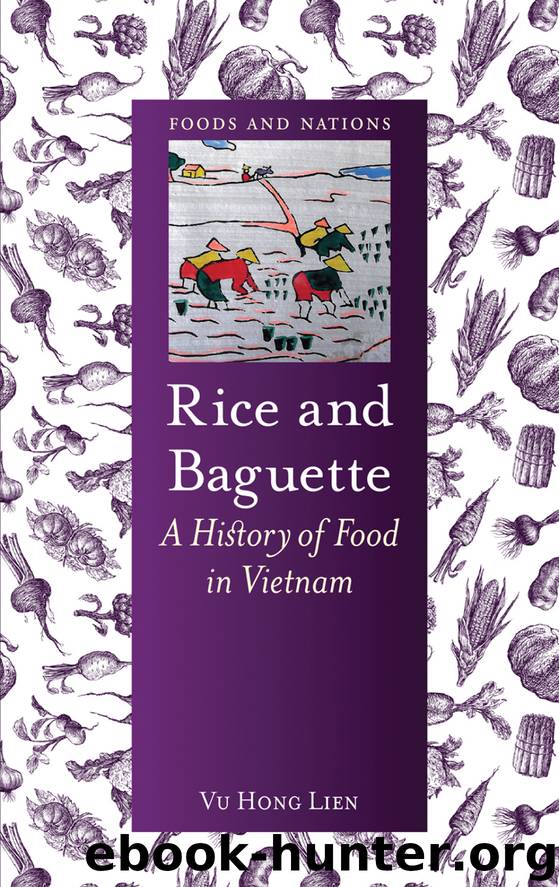Rice and Baguette by Vu Hong Lien

Author:Vu Hong Lien
Language: eng
Format: epub
Publisher: Reaktion Books
OPIUM
As well as alcohol, the Vietnamese were also encouraged to consume more and more of another agricultural product that was imported into Vietnam and manufactured into a deadly, addictive drug controlled by the French authorities. During the French century, opium was a state-sponsored product that was grown and processed on an industrial scale. Those who could afford it could buy their own opium-smoking set, comprising a pipe, a knife with which to scrape the substance off its container to form a tiny pea, a spirit lamp and needles to cook the opium pea over the lamp and to insert the smoking pea into the pipe. These opium sets gradually became more elaborate, with intricate designs, and later became prized possessions for many French and Vietnamese collectors.
Those who could not afford a set, or who wished to hide their addiction from their families, went to opium dens. In these large rooms set up like dormitories with bare wooden beds and attendants, the smoker lay down and was served a pipe or two by an attendant. He or she then fell into a short sleep and woke up feeling calm and contented, without any side effects such as a hangover.5 This may be why opium became addictive so quickly and so easily. Eventually, as with all addictive drugs, the addicts lost interest in everything except the drug, and financial ruin was inevitable, not to mention other high costs.
In the early nineteenth century, before it became a state-sponsored drug in Vietnam, opium was the cause of a bitter war between the British and the Chinese, which China lost. From Vietnam, the Nguyễn emperors viewed the situation with alarm and officially banned opium. However, during the early years of the French century, opium was introduced into Vietnam by the Chinese and sold privately in opium dens under licence. The Chinese were at first given licences to farm poppies for opium extraction, but in 1881 the French governor Charles Le Myre de Villers decided to place opium under direct governmental control, making it a French monopoly, as alcohol was. The reason for this, he said, was that he believed the farms owned by the Chinese could become a threat to the security of the territory and a challenge to French interests. A manufacturing plant was established in Saigon that year, accompanied by many distributors. The opium business grew enormously at the beginning of the twentieth century when the five current opium agencies of Indochina were grouped into a monopoly under Doumer. Official opium was still available in large quantities in Saigon even after the signing of the Convention of La Haye in January 1912, which made opium trafficking illegal, except for medicinal purposes. For most of the French century, opium was an important source of income for the colonial authorities, and the cause of misery among many generations of Vietnamese. Following the departure of the French from Vietnam in 1954, campaigns to eradicate the opium poppy were launched in earnest, opium dens and manufacturers were closed, opium smokers were driven underground and the habit eventually petered out.
Download
This site does not store any files on its server. We only index and link to content provided by other sites. Please contact the content providers to delete copyright contents if any and email us, we'll remove relevant links or contents immediately.
A Court of Wings and Ruin by Sarah J. Maas(7807)
The Death of the Heart by Elizabeth Bowen(3601)
The Sprouting Book by Ann Wigmore(3583)
Better Homes and Gardens New Cookbook by Better Homes & Gardens(3579)
BraveTart by Stella Parks(3439)
Salt, Fat, Acid, Heat: Mastering the Elements of Good Cooking by Nosrat Samin(3138)
Sauces by James Peterson(3086)
Kitchen confidential by Anthony Bourdain(3077)
The Bread Bible by Rose Levy Beranbaum(3064)
Classic by Mary Berry(3008)
Solo Food by Janneke Vreugdenhil(2962)
Ottolenghi - The Cookbook by Yotam Ottolenghi(2926)
Martha Stewart's Baking Handbook by Martha Stewart(2849)
Day by Elie Wiesel(2778)
Betty Crocker's Good and Easy Cook Book by Betty Crocker(2710)
My Pantry by Alice Waters(2606)
The Plant Paradox by Dr. Steven R. Gundry M.D(2599)
The Kitchen Counter Cooking School by Kathleen Flinn(2513)
Hot Sauce Nation by Denver Nicks(2488)
